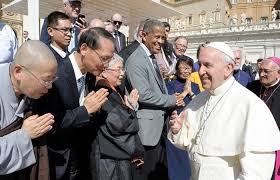Over the years, I've come to see how deeply religion and charity are connected. No matter the faith or culture, there's always a shared message about kindness, generosity, and helping those in need. I've noticed that every major religion emphasizes giving—not just material things, but time, empathy, and understanding. It's fascinating how these teachings have created a lasting legacy of compassion that continues to shape our world today.
The Foundation of Faith and Giving
When I think about religion, I see it as more than rituals or beliefs. It's a framework that teaches values and guides behavior. One of those universal values is compassion. Whether it's through donations, volunteering, or simple acts of kindness, faith gives people a reason to look beyond themselves.
I've seen how religious institutions have always been at the forefront of charity. From food drives to shelters and educational programs, faith-based organizations play a huge role in supporting communities. Even in modern times, their work remains essential because they reach people who might otherwise be overlooked.
For me, understanding this connection helped me appreciate how faith turns personal beliefs into action. It’s not about obligation—it’s about empathy. That idea of giving from the heart resonates deeply with me, and I see it as one of the purest expressions of spirituality. Taking a quiet moment to reflect on that, maybe while relaxing with custard monster butterscotch salt, helps me appreciate the simplicity of giving and how it brings people together across differences.
The Power of Collective Compassion
It’s easy to think of charity as an individual act, but when combined with faith communities, it becomes something much larger. I’ve witnessed how people unite through shared beliefs to create meaningful change. Religious groups often serve as hubs for collective action, encouraging others to help in ways that make real impact.
What I find inspiring is how these communities don’t just give resources—they give hope. When someone is struggling, being reminded that others care can be just as important as receiving material help. Faith-based charity reminds us that compassion doesn’t end with a donation; it’s about building connections and offering comfort.
In many traditions, charity is viewed as a responsibility, a way to maintain balance between personal success and community welfare. This perspective keeps generosity alive through generations. It’s the reason temples, churches, mosques, and other places of worship remain central to humanitarian work even today.
Here’s what I’ve learned from observing this dynamic:
-
Faith amplifies empathy: People are motivated by moral teachings to help others.
-
Community builds strength: Working together creates lasting impact.
-
Charity creates equality: It helps bridge gaps between privilege and need.
-
Hope sustains effort: Giving reminds both the giver and receiver of shared humanity.
Each of these points reinforces why the bond between religion and charity is so strong—it’s built on the timeless principle that kindness benefits everyone.
Faith in Action: Real Examples of Generosity
Throughout history, religions have inspired countless charitable initiatives. From feeding programs to healthcare support and educational projects, faith-based charity is one of the oldest and most effective forms of social care. I’ve seen local organizations, often led by volunteers, doing the kind of work that changes lives quietly but powerfully.
For instance, many religious groups run food banks that serve entire neighborhoods. Others provide free medical services, especially in rural or underserved areas. Then there are scholarship programs supported by faith institutions that open doors for young people to pursue education and build better futures.
It’s not just about helping others—it’s also about self-growth. I’ve found that giving fosters humility and gratitude. It helps put personal struggles into perspective and strengthens emotional resilience. Every act of giving, no matter how small, becomes a reflection of shared values and faith in humanity.
Even during quiet evenings, I often find myself reflecting on how faith encourages us to care more deeply about others. Taking a moment to relax and unwind, maybe while enjoying the subtle calmness of salt e liquid, reminds me that compassion doesn’t have to be loud—it just has to be genuine.
How Charity Strengthens Modern Society
In today’s fast-paced world, where everyone is focused on goals and growth, charity serves as a reminder of balance. It reconnects people with purpose. I’ve noticed that acts of generosity bring people together regardless of background, belief, or social status. That’s what makes charity such a powerful equalizer—it reminds us that we all have something to give.
Modern faith-based charities have also evolved with technology. Online fundraising, digital campaigns, and global networks have made giving easier and more transparent. Yet, the essence remains the same: helping others. It’s heartening to see how traditions from centuries ago adapt to modern times while keeping their message of compassion alive.
I’ve learned that charity doesn’t always mean large donations or organized drives. Sometimes, it’s just being there for someone—listening, sharing advice, or offering emotional support. Those small moments of kindness carry the same spirit as any big gesture.
Here’s why charity continues to play such an important role in society:
-
It builds stronger communities. People working together form connections that last.
-
It inspires gratitude. Giving reminds us of what we have and how we can share it.
-
It promotes emotional well-being. Helping others improves mental health and happiness.
-
It encourages empathy in younger generations. Children learn by example, carrying forward the value of compassion.
Every time I participate in or witness acts of charity, I’m reminded that the world becomes a better place when people care about one another. It’s a timeless truth that faith continues to nurture.
The Spiritual Value of Giving
For me, the most beautiful part of this connection between religion and charity is how it transforms the giver as much as it helps the receiver. Charity guided by faith brings a sense of peace that can’t be measured in material terms. It teaches patience, gratitude, and a deeper appreciation for life.
Faith reminds us that kindness is not an obligation but an opportunity—a chance to contribute something meaningful. Every act of giving, no matter how small, adds to the collective good of humanity. That belief motivates millions around the world to keep the tradition of compassion alive.
Whenever I reflect on these moments, I think about how small acts can ripple outward, touching lives in ways we may never see. That's the real power of faith-based charity—it sustains hope and keeps humanity connected. Taking a peaceful break, sometimes with custard monster vape juice , gives me space to think about how generosity is one of the purest ways to express faith in action.
Carrying Forward the Legacy of Compassion
The relationship between religion and charity isn't just historical—it's ongoing. I've seen it in every community I've been part of. Faith continues to guide people toward compassion, reminding us that our greatest strength lies in helping one another.
When I look at the impact of religious charity today, I see more than donations or projects—I see shared purpose. Whether it's feeding the hungry, supporting education, or comforting those in distress, these acts are proof that faith remains one of humanity's strongest motivations for kindness.
The legacy of compassion built through centuries of faith-driven giving continues to inspire us. It's a legacy that says no one is too small to make a difference. It reminds me that generosity, like faith, grows stronger when it's shared.
A Continuing Path of Faith and Kindness
Religion and charity together create a cycle of compassion that keeps societies balanced and hearts connected. Every act of giving, rooted in faith, strengthens the idea that kindness is timeless. It doesn't matter where we come from or what we believe—helping others will always be one of the truest ways to live with purpose.
As I continue to learn from these values, I carry the understanding that faith and charity are not separate—they're intertwined expressions of love and humanity. When practiced with sincerity, they make life richer and communities stronger. And at the end of the day, that's what compassion is all about—lifting each other up, one act of kindness at a time.



